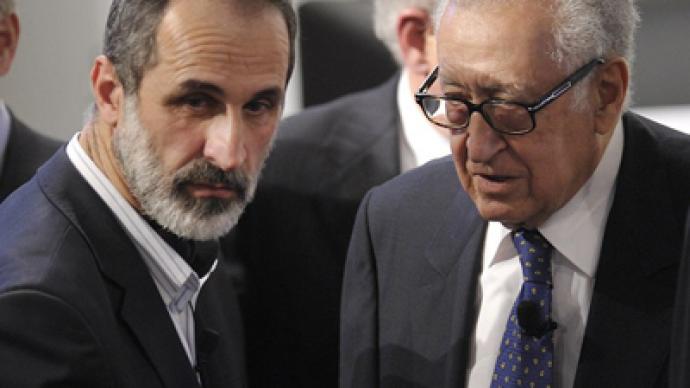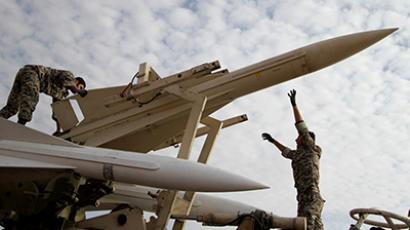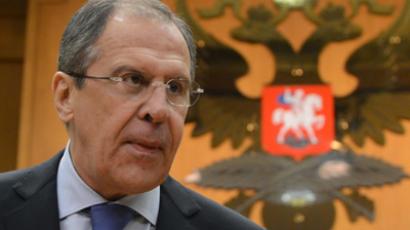‘SNC knows Syrian government will not be defeated on the military battlefield’

Hopes for progress in Syria were raised after Russia's FM Sergey Lavrov met with the leader of the main opposition group. But peace is impossible while other governments are influencing the conflict, political analyst Marcus Papadopoulos told RT.
While addressing the Munich Security Conference Lavrov explained that despite the worsening situation in the region, peace is still within reach and the war in Syria “could be over if all sides stuck honestly and loyally to the principles of the June 30 Geneva conference.”On the sidelines of the conference, Lavrov met for the first time with Syrian opposition chief Ahmed Moaz al-Khatib. The meeting was closed to the media.The editor of Politics First Magazine, Marcus Papadopoulos, told RT that the fact that the Syrian National Coalition agreed to hold talks with Russian foreign minister means the opposition acknowledges that the Syrian government “is not going to be defeated on the military battlefield.”RT: Could these talks between Lavrov and a senior opposition leader be a sign of a breakthrough… that the Syrian opposition could soon be willing to negotiate?MP: Peace treaties are not concluded overnight. They take a long time, a lot of compromises required by the parties involved. And also responsible behavior is absolutely critical by outside players. So, yes, it’s a potentially positive development what happened just there – the meeting between the leader of the self-proclaimed Syrian National Coalition and the foreign ministers of Russia and Iran. And I think it’s an acknowledgement by the leader of the Syrian National Coalition that the Syrian government is not going to be defeated on the military battlefield, and that’s something, unfortunately, that Western politicians and western journalists had been saying was going to happen, that the Syrian government is going to be defeated on the battlefield. And this acknowledgement, that thousands of Syrian civilians have died unnecessarily and all because outside players in the region – Turkey, Saudi Arabia and Qatar – have been flowing weapons and cash to the militants in Syria. And after two years it’s still blatantly evident that the Syrian army has the upper hand on developments on the battlefield in Syria. So, I would say – potentially it’s a good development. Peace can ever only be achieved by talking, by understanding. But we are at a very early stage. So, we do need to be cautious. RT: The Syrian opposition earlier said it is ready for talks, but only if President Assad has no role in the transitional government. Do you think Assad will accept that?MP: I will come to that question by a number of questions. Firstly, President Assas is the legitimate President of Syria. Secondly, I think Sergey Lavrov, the Russian foreign minister said last year how surprised he was by the naivety of the foreign-based Syrian opposition in calling President Assad to go from power, to resign, to step down, etc. That’s not the way diplomacy works, that’s not the way peace process are put together. So, in answer to your question it’s not a realistic expectation that President Assad should step down. He’s made it very clear: he will not step down. But also he is the legitimate President of Syria – that’s something that, unfortunately, in the west is completely discarded. In line with international law, in line with the UN – the Syrian government is the only legitimate force, the Syrian army – is the only legitimate armed force on Syrian territory.I think it’s very unrealistic for the former Syrian-based opposition to expect President Assad would step down, but I suspect that if talks do develop between the former opposition in the Syrian government, then they are going to start to relinquish those goals, because they realize, that they are unrealistic. RT: Russia’s foreign minister said the tragic situation in Syria could have been averted if all states shared the goal of ending violence. Do you agree?MP: I absolutely agree with that. Unfortunately what we’ve seen – in particular over the last year – is certain payers in the region – Turkey, Saudi Arabia and Qatar – they have made situation so very much worse in Syria. What they have done is – because in the last year – the Syrian militants have had some successes (notably along the Turkish border and along the border with Iraq), and what these players have done (the Saudi Arabia, Qatar and Turkey) is they’ve sent terrorists into Syria, they’ve sent weapons into Syria and they’ve given the militants cash. So, what really needs to happen at some point? The actions of those 3 countries do need to be analyzed by the international community and the governments of those 3 countries need to be held to account, because Hillary Clinton about a year ago accused the Russian government of having blood on its hands. Unfortunately, it’s more the countries Turkey, Qatar and Saudi Arabia, who have the blood of thousands of Syrian civilians on their hands because of their own geostrategic ambitions – the removal of President Assad and the Syrian government.














